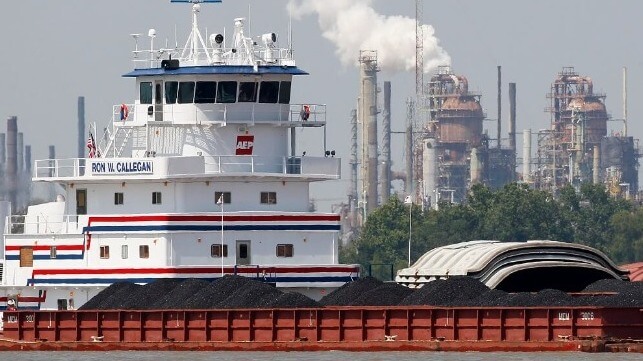The Jones Act is U.S. Wealth and Prosperity

The Chinese government has shut down Shanghai due to the Zero COVID Tolerance plan, leaving many of the 26 million residents without food or income. Beijing may be next. The Port of Shanghai and the Beijing port of Tianjin handle about 55 million TEUs per year, and more than 30 percent of global port congestion is in China. Trade with China accounts for about nine percent of U.S. exports and 19 percent of U.S. imports, so these disruptions have a real impact on the American economy.
Meanwhile, the U.S. will continue to face supply chain issues, port congestion and inflation, which have not stopped the anti-Jones Act activists from trying to repeal the 102-year-old cabotage law. They say the repeal would create a balanced economy based on laissez-faire principles, which will help the oil industry to use foreign-flag tankers to deliver oil products to many U.S. ports during voyages.
Through good times and bad, wars and depressions, peace and prosperity, the Jones Act has proved its worth time and time again. Today, it stands as a bulwark against the challenges facing the U.S. economy, which has suffered from the high cost of ocean freight. Container rates soared by 250 percent in 2021, adding lots to the cost of everything.
Timing is everything, they say, and Jonathan Helton, an intern at the Tennessee General Assembly and research associate at the Grassroot Institute of Hawaii, has seized the opportunity to bash the Jones Act by saying that ending it would reduce the cost of gasoline at the pump and stimulate the economy of Hawaii. Helton is currently working his way through college, and his anti-Jones Act manifesto, is complete with term paper endnotes.
And he’s not the only one. Ted Cruz (R-TX), a recipient of $5 million in annual oil company donations, and Mike Lee (R-UT), who benefits handsomely from the oil lobby, want to repeal the Jones Act and free America’s marine highways of Americans. On March 23, 2022, during the Senate hearing on the restrictions on inter-U.S. trade of natural gas, Cruz offered the Cruz Amendment 1, which would “temporarily remove U.S. cabotage” restrictions because Americans living in New England can get natural gas cheaper from Russia than they can from the Sabine Pass.
Cruz misses the point here. He forgets to mention that two states bordering New England – New York and Pennsylvania – have tons of cheap shale gas available, but they can’t get it to places like Boston and Portland, Maine. Why? Not because of the Jones Act, but because states like Massachusetts and Maine won’t allow pipelines to be built to transport it.
Cruz also forgets to mention that the U.S. has one of the world’s largest natural gas reserves, behind only Russia, Iran and Qatar. With more than 2,900 trillion cubic feet of natural gas, U.S. supplies could last more than 100 years. Furthermore, the U.S. has more than 264 billion barrels of recoverable crude oil, more than Russia, Saudi Arabia, Canada, Iran and Brazil.
There’s no reason for the U.S. to be dependent on foreign energy, which is more evident than ever as Russia invades Ukraine and threatens to cut off oil and gas supplies to the Europeans and Asia. The world is being held hostage to the whims of a dictator who has no respect for humanity and threatens the world with nuclear destruction.
The Jones Act Is U.S. Wealth and Prosperity
The hyper-globalization of the past decades is fast ending as more countries consume their products and rely less on imports. China, the world's workbench, recently released its 14th Five-Year Plan, which wants to boost domestic consumption and expand domestic markets for its manufactured goods.
The Covid-19 pandemic demonstrated to the U.S. economy that the “just in time” business model is flawed, which left empty shelves and warehouses worldwide. But the U.S. mobilized its supply chains thanks partly to Jones Act companies, which delivered commodities in the inland waterways and along the coastal marine highways.
The U.S. must become energy-independent and rebuild its domestic manufacturing base. Meanwhile, the Jones Act infrastructure is in place and providing the groundwork to build more vessels and train many more U.S. mariners. The Jones Act has been an essential and vital part of the U.S. economy for more than 100 years. Let’s keep paid-for politicians like Cruz and Lee away from one of our most cherished institutions, which supports hundreds of thousands of well-paying jobs and generates hundreds of millions of dollars in economic activity.
The Jones Act is the wealth and prosperity on which to build America’s future.
Tony Munoz is the publisher and editor-in-chief of The Maritime Executive
The opinions expressed herein are the author's and not necessarily those of The Maritime Executive.
